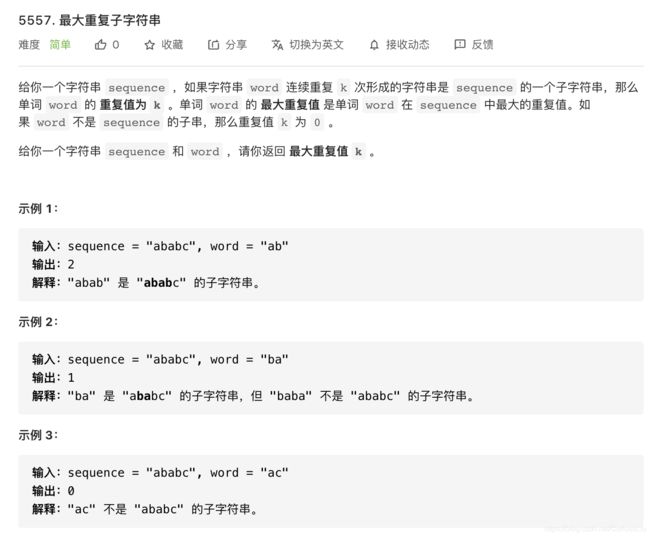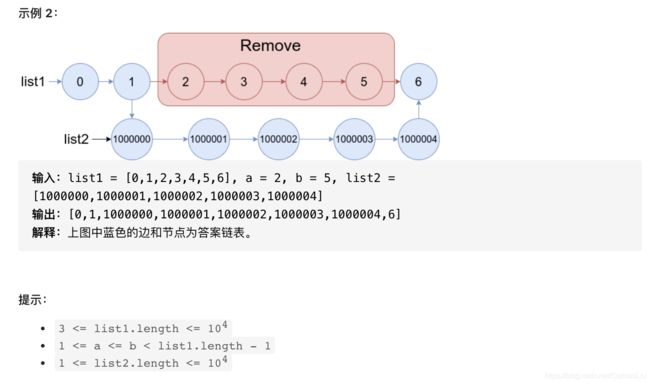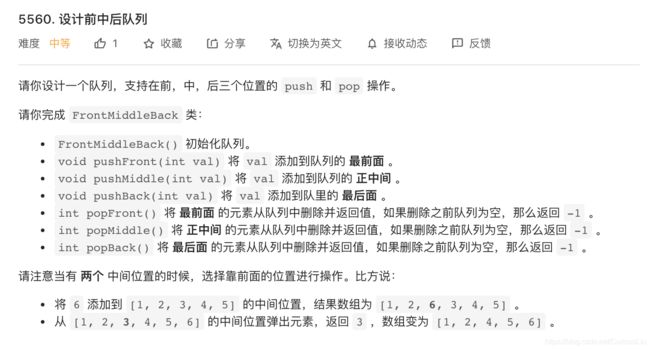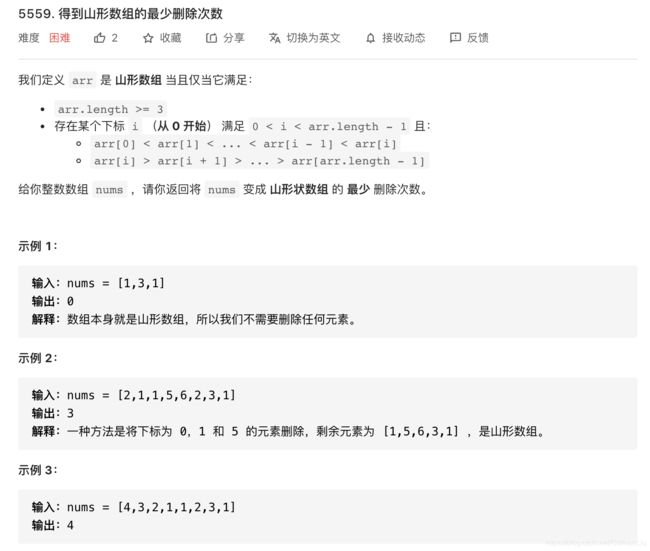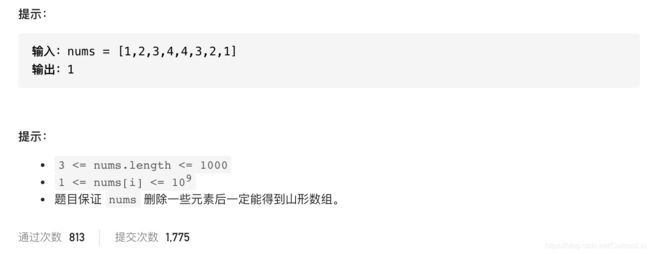2020.11.28-LeetCode第40场双周赛复盘(2easy1medium1hard)
2020.11.28-LeetCode第40场双周赛复盘
不定期参加周赛、双周赛,希望不管难度,搞懂每一次参加竞赛的所有题目
目录
5557. 最大重复子字符串(easy)
题目
题目分析
代码解答(注:未重构代码,代码质量可能较差,也希望在学习做题过程中不断提升)
5558. 合并两个链表(medium)
题目
题目分析
代码解答(注:未重构代码,代码质量可能较差,也希望在学习做题过程中不断提升)
5560. 设计前中后队列(medium)
题目
题目分析
代码解答(注:未重构代码,代码质量可能较差,也希望在学习做题过程中不断提升)
5559. 得到山形数组的最少删除次数(hard)
题目
题目分析
代码解答(注:未重构代码,代码质量可能较差,也希望在学习做题过程中不断提升)
5557. 最大重复子字符串(easy)
题目
题目分析
该题一开始希望找到一些函数调用的方法,但是似乎没有找到比较期望的函数,再加上应该是一道签到题,就沿用了之前C/C++语言解题的思想,一段一段找,如果找到了让i跳出这个单词长度的距离,如果没有找到则让i+= 1。
这个题个人记录需要注意的问题是在python提供的for循环中,即使使用了for i in range(xxx): 在循环体内部仍然无法对i变量进行修改,示意如下:
>>> for i in range(0,5):
... i += 1
... print("i:", i)
...
i: 1
i: 2
i: 3
i: 4
i: 5代码解答(注:未重构代码,代码质量可能较差,也希望在学习做题过程中不断提升)
class Solution(object):
def maxRepeating(self, sequence, word):
"""
:type sequence: str
:type word: str
:rtype: int
"""
maxCount = 0
count = 0
lenWord = len(word)
i = 0
while i maxCount:
maxCount = count
else:
i += 1
count = 0
return maxCount 5558. 合并两个链表(medium)
题目
题目分析
链表操作题,关键在于开始要记录对于list1中最终结尾拼接的位置处,可以先用list1往后走b次找到这个位置,之后进行整体链表的拼接即可
代码解答(注:未重构代码,代码质量可能较差,也希望在学习做题过程中不断提升)
# Definition for singly-linked list.
# class ListNode(object):
# def __init__(self, val=0, next=None):
# self.val = val
# self.next = next
class Solution(object):
def mergeInBetween(self, list1, a, b, list2):
"""
:type list1: ListNode
:type a: int
:type b: int
:type list2: ListNode
:rtype: ListNode
"""
countList1 = 0
countList2 = 0
head = list1
headB = list1
while headB and countList2 <= b:
countList2 += 1
headB = headB.next
while head and countList1 < a-1:
countList1 += 1
head = head.next
head.next = list2
while list2.next:
list2 = list2.next
list2.next = headB
return list1
5560. 设计前中后队列(medium)
题目
题目分析
该题其实是一道发挥空间较大的题,同时也是面试比较常见类型的,实现一个具体内容的题目,目前仅使用了在做题过程中想到的数组模拟办法,其他办法以及该数组模拟方法的时空复杂度均有待进一步分析
代码实现上其实就是对于角标的计算,拼接等操作,注意如果使用list.insert(targetIndex, value)在中间插入,和删除中间的元素,角标的计算方式是不同的
代码解答(注:未重构代码,代码质量可能较差,也希望在学习做题过程中不断提升)
class FrontMiddleBackQueue(object):
def __init__(self):
self.queue = list()
def pushFront(self, val):
"""
:type val: int
:rtype: None
"""
self.queue.insert(0, val) # 0处插入val
print(self.queue)
def pushMiddle(self, val):
"""
:type val: int
:rtype: None
"""
middle = (len(self.queue)) // 2
self.queue.insert(middle, val)
print(self.queue)
def pushBack(self, val):
"""
:type val: int
:rtype: None
"""
self.queue.append(val)
print(self.queue)
def popFront(self):
"""
:rtype: int
"""
try:
print("hello", self.queue)
tempFront = self.queue[0]
self.queue = self.queue[1:]
return tempFront
except:
return -1
def popMiddle(self):
"""
:rtype: int
"""
try:
middle = (len(self.queue)-1) // 2
tempMiddle = self.queue[middle]
self.queue = self.queue[0:middle] + self.queue[middle+1:]
return tempMiddle
except:
return -1
def popBack(self):
"""
:rtype: int
"""
try:
tempBack = self.queue[-1]
self.queue = self.queue[0:len(self.queue)-1]
return tempBack
except:
return -1
# Your FrontMiddleBackQueue object will be instantiated and called as such:
# obj = FrontMiddleBackQueue()
# obj.pushFront(val)
# obj.pushMiddle(val)
# obj.pushBack(val)
# param_4 = obj.popFront()
# param_5 = obj.popMiddle()
# param_6 = obj.popBack()5559. 得到山形数组的最少删除次数(hard)
题目
题目分析
在答案提示下该题是经典的最长上升子序列算法(LIS:Longest Increasing Subsequence)的变种,一个山峰可以看做一遍从正向的最长上升子列,和一遍从逆向的最长上升子列,为了取到一个使得两者都更优的点,在选取“山峰尖”的时候,需要综合考虑该点在正向和逆向的表现,这里还有一个难绕过来的点:正向求最长上升子列,得到的列表是一个正的最长上升;逆向求最长上升子列,得到的列表是一个逆向的最长上升。以目标结果来看,期望综合两个序列选择一个最优“山峰尖”点,假设期望选择第0个元素作为山峰尖点(注*:实际上根据要求开头,结尾点不能做山峰尖点),这时候应该统计正向上升到第0个位置处的最长上升子列,以及负向上升到第len(nums)-1位置处的点的最长上升序列,对两者进行加和后,减1去掉该点的重复计算。
对于LIS问题的补充说明:最长上升子列的问题是一个经典的DP问题,对于此类问题首先再在本博客中归纳特征:将一组序列改变为另一组序列,的最小次数,设置dpArray数组作为一维DP数组,其中每个dp位置处的代表意义是:对于序列的当前角标位置处,所能达到的最长上升长度。
为此,对该位置的值进行求解,需要从0开始遍历该位置之前的dp序列,代表对于之前每个位置处,所能达到的最长上升序列长度,于是如果该位置处的元素大于了之前的某个元素,也就是说构成了上升序列,那就可以使得当前位置处的dp状态等于这一被大于位置处的dp状态+1,另需要注意由于当前位置可能大于多个当前位置的之前位置,需要比较这些值,以获取最大的上升子序列。
代码解答(注:未重构代码,代码质量可能较差,也希望在学习做题过程中不断提升)
def findMaxUpperList(tempList):
dpArray = [1 for x in range(len(tempList))] # memset全为1,LIS最小是1
for i in range(1, len(tempList)):
maxx = 1
for j in range(0, i): # 从前到现在
if tempList[i] > tempList[j]: # 如果上升,找到一个能使得其最长上升的 也就是说dpArray是相较于这个位置,找到能使得自己最长上升的
if dpArray[j] + 1 > maxx:
maxx = dpArray[j] + 1
dpArray[i] = maxx
return dpArray
class Solution(object):
def minimumMountainRemovals(self, nums):
"""
:type nums: List[int]
:rtype: int
"""
a = findMaxUpperList(nums)
b = findMaxUpperList(nums[::-1])
tempMax = 0
for i in range(1, len(a)-1): # 为什么不从0开始(为什么掐头去尾) -> 山顶不能出现在左右两边
if a[i] + b[len(a)-i-1] - 1 > tempMax:
tempMax = a[i] + b[len(a)-i-1] - 1 # 一正一反,两个上升
return len(a) - tempMax
